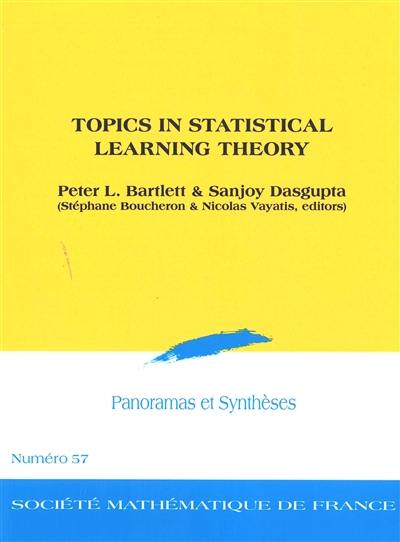
Fiche technique
Format : Broché
Nb de pages : 89 pages
Poids : 400 g
Dimensions : 18cm X 24cm
ISBN : 978-2-85629-964-7
EAN : 9782856299647
Topics in statistical learning theory
Quatrième de couverture
Ce volume est le résultat d'une série de trois cours sur la théorie statistique de l'apprentissage données à l'Institut Henri Poincaré en 2011 sous l'égide de la Société Mathématique de France. Le chapitre de présentation propose un survol de l'histoire de la théorie statistique de l'apprentissage, de ses racines, de ses outils mathématiques et des questions qui la constituent. Le chapitre « Algorithms for minimally supervised learning » par Sanjoy Dasgupta décrit les progrès de l'informatique théorique sur les questions d'apprentissage non supervisé (clustering) et sur l'apprentissage dit actif. De façon assez surprenante, ces progrès sont dus en grande partie à la confrontation de la théorie de la concentration de la mesure, de la théorie de la complexité et des pratiques établies en statistique numérique.
Le chapitre « Online prediction » par Peter Bartlett porte sur l'apprentissage en ligne. Il s'agit d'une confrontation entre statistique, théorie des jeux et optimisation.
This volume is the outcome of a series of three lectures on statistical learning theory given at Institut Henri Poincaré in 2011 under the auspices of the Société Mathématique de France. The introductory chapter provides an overview of the history of Statistical Learning Theory, its roots, its mathematical tools and the questions that make it. The chapter « Algorithms for minimally supervised learning » by Sanjoy Dasgupta describes the progress of theoretical computer science on the issues of unsupervised learning (clustering) and active learning. Surprisingly, much of this progress is due to the confrontation of measurement concentration theory, complexity theory and established practices in numerical statistics.
The chapter « Online prediction » by Peter Bartlett focuses on online learning. It is a confrontation between statistics, game theory and optimization.






